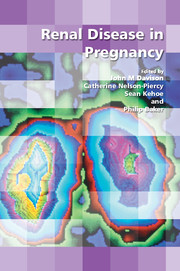Book contents
- Frontmatter
- Contents
- Participants
- Preface
- SECTION 1 RENAL PHYSIOLOGY IN PREGNANCY
- SECTION 2 PATTERNS OF CARE
- SECTION 3 CHRONIC KIDNEY DISEASE
- 6 Pregnancy and dialysis
- 7 Pregnancy and the renal transplant recipient
- 8 Reflux nephropathy in pregnancy
- 9 Lupus and connective tissue disease in pregnancy
- 10 Diabetic nephropathy in pregnancy
- SECTION 4 DRUGS USED IN RENAL DISEASE IN PREGNANCY
- SECTION 5 ACUTE RENAL IMPAIRMENT
- SECTION 6 UROLOGY AND PREGNANCY
- SECTION 7 SURGICAL AND MEDICAL ISSUES SPECIFIC TO RENAL TRANSPLANT PATIENTS
- SECTION 8 CONSENSUS VIEWS
- Index
10 - Diabetic nephropathy in pregnancy
from SECTION 3 - CHRONIC KIDNEY DISEASE
Published online by Cambridge University Press: 05 September 2014
- Frontmatter
- Contents
- Participants
- Preface
- SECTION 1 RENAL PHYSIOLOGY IN PREGNANCY
- SECTION 2 PATTERNS OF CARE
- SECTION 3 CHRONIC KIDNEY DISEASE
- 6 Pregnancy and dialysis
- 7 Pregnancy and the renal transplant recipient
- 8 Reflux nephropathy in pregnancy
- 9 Lupus and connective tissue disease in pregnancy
- 10 Diabetic nephropathy in pregnancy
- SECTION 4 DRUGS USED IN RENAL DISEASE IN PREGNANCY
- SECTION 5 ACUTE RENAL IMPAIRMENT
- SECTION 6 UROLOGY AND PREGNANCY
- SECTION 7 SURGICAL AND MEDICAL ISSUES SPECIFIC TO RENAL TRANSPLANT PATIENTS
- SECTION 8 CONSENSUS VIEWS
- Index
Summary
In contemplating a pregnancy, women with diabetic nephropathy have to consider the dual risks of diabetes and their impaired renal function to a pregnancy. Furthermore, they need advice on the potential for such a pregnancy to further compromise their renal function. They will need to make a considered long-term judgement of the risks involved, which requires that they are well informed about their prognosis even in the absence of pregnancy. It is most appropriate if this information is presented to them in a context that is remote from pregnancy, rather than when they are pregnant, and therefore requires that a system exists to ensure that all women in this situation of childbearing age receive prepregnancy counselling.
Introduction
With the increasing prevalence of type 2 diabetes and increased longevity, diabetes has become the most common cause of end-stage renal disease (reviewed by American Diabetes Association and How and Sibai). Approximately 20—30% of all patients with diabetes progress to nephropathy. A smaller proportion of those with type 2 diabetes progress to end-stage renal disease and death from cardiovascular causes prevents progression to end stage renal disease. It is thought that approximately 8% of renal failure in the diabetic population is due to causes other than diabetic nephropathy and hence wider investigation may be required. Biopsy must be considered if disease progression is atypical, especially in the absence of retinopathy.
- Type
- Chapter
- Information
- Renal Disease in Pregnancy , pp. 111 - 126Publisher: Cambridge University PressPrint publication year: 2008

